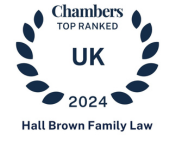Hybrid Mediation
Hall Brown Family Law offer a bespoke hybrid mediation service to assist in any children or financial disputes. This service is a means of resolving disputes in an amicable, non-confrontational manner that meets the needs of both participants and allows participants to have their legal advisors and/ or other professionals present.
What is hybrid mediation?
Best suited for high conflict mediation sessions and complex high net worth financial matters.
Hybrid mediation is an adaption of the standard model of meditation. The main difference between the two models is that the mediator can hold confidences that do not need to be shared
with the other participant in separate meetings, which can therefore aid the mediator in assisting the participants to reach a decision.
In the more traditional mediation sessions, any information disclosed needs to be shared with all participants for the mediation to continue, which sometimes can hinder the process and the
participants’ ability to have trust and confidence in the mediator. Hybrid mediation allows discussion to be explored with the mediator with the client feeling at ease that certain information
will not be passed to the other participant without their consent. The ability for the participants’ legal advisor to be present with them also allows the participants to have immediate legal advice to assist them in the decision process. Discussions tend to take place in separate rooms which may be beneficial in high conflict cases or for more vulnerable clients, who require the additional support.
Hybrid mediation is also particularly beneficial in domestic violence cases where more traditional mediation would not be suitable as the participants can remain in separate rooms with their legal advisor, whereas if they attended court, they may have to have direct contact with the other participant at court hearings. Hybrid mediation can also take place via Zoom or Teams, allowing an additional layer of support to clients who can attend the hybrid mediation in the comfort of their own home.
What does the hybrid mediation process look like?
Step 1 – Mediation Information Assessment Meeting (“MIAM”)
An initial assessment meeting needs to take place with both participants individually to assess whether mediation is a suitable means to resolve the dispute and to see if each participant
wishes to engage in the hybrid mediation process. The mediator will discuss with each participant separately the issues and discuss how these can be resolved, allowing that
participant to make an informed decision as to the next steps.
Step 2 – Joint hybrid mediation sessions
The participants may wish to start the hybrid mediation themselves and involve their solicitors at a later date, once the participants have exchanged financial disclosure or narrowed the issues.
Each situation is different, and the mediation sessions can be tailored to suit each participants individual circumstances. The initial assessment meeting is important to assess the issues and
discuss a plan of how the hybrid mediation should take place. It may be beneficial to involve the participants’ solicitor early in the process and agree an agenda and what role they will play. This can take place with all participants present or with only the participants’ legal representatives.
In domestic violence cases, it can be arranged that neither participant has any contact with the other participant, and they can have their legal advisors present with them in all meetings and/or a divorce coach, domestic violence support worker etc. Meetings can last for as long as is needed, be it an hour or a full day.
Following each session, we prepare a session record which includes detailed, clear, and concise information to assist you and your client in progressing matters.
The role of the legal advisor is to support their client- the mediator remains in control of the mediation sessions.
Step 3 – Reaching an agreement
Following the hybrid mediation session in matters involving children, we write a memorandum of understanding that details all agreed arrangements. This will be in the style of a ‘Parenting Plan’. At this stage, the memorandum will not be legally binding. However, it can be discussed in the session with the legal advisors if a court order is necessary.
In financial matters, we can prepare a memorandum of understanding that details all agreed arrangements or alternatively legal representatives can attend the mediation session to draw up
the agreement reached in a legally binding document. Having the legal advisor present in the session(s), eliminates the risk of either participant’s legal advisor raising any issue following an agreement reached or raising issues which were not discussed in the session, which can sadly lead to the agreement unravelling. This can be more cost effective and save time, especially if participants wish to get the agreement sealed at court as soon as possible.
We are equipped to bring experts into the hybrid mediation, such as pension actuaries, coaches, accountants or financial advisors. They can also be present in the mediation should it be deemed necessary. We also have experience in identifying issues such as domestic violence, parental alienation, coercive control, and gaslighting, and ensure that both participants are on equal footing at all times throughout the process. If we do have ongoing concerns, we will deem mediation as unsuitable and stop the sessions.
No agreement
If attempts at mediation fail, we will try to steer away from the court process by suggesting further forms of alternative dispute resolution such as arbitration, early neutral evaluation or private financial dispute resolution hearings. We aim to limit the issues outstanding, which in turn should reduce legal costs and conflict between the participants. It is hoped that if an agreement cannot be reached that a clear plan is agreed in the hybrid mediation session with both participants and their legal advisors.
Early Neutral Evaluation
If participants reach an impasse within the mediation process, we can offer an early neutral evaluation similar to a private financial dispute resolution hearing. As the mediator, we would
help prepare a brief to a neutral evaluator, often a retired judge or barrister who will in turn deliver a judgement as to his or her views on the issues in hand. This is not legally binding but will allow the participants to then attend a joint hybrid mediation session with the help and support of their legal advisors.
Arbitration
If participants reach an impasse within the mediation process, the mediator can assist them in completing their Arb1 form and limit the issues that the arbitrator needs to determine on. This is legally binding on both participants. It is also possible that if they reach an impasse on a certain point, for instance how to share the net sale proceeds, they can refer back to mediation to reach an agreement on the rest of the financial matters.
Why choose hybrid mediation?
- Cost effective: The participants can have the benefit of legal advice within the session which in turn reduces duplication and can save costs.
- More efficient: It can mean that fewer sessions are required as the participants are able to make decisions in the session as they can have the benefit of legal advice within the session.
- Less likely to fail: If legal advisors are involved in the mediation process and are providing advice within the session, the success rate of reaching an agreement is higher.
- Reduces conflict: By discussing matters direct in a session, this eliminates protracted correspondence, which can be read as inflammatory or taken in the wrong context. Issues can also be quashed quickly in a session rather than protracted correspondence back and forth between legal advisors.
- Empowered: Participants feel comfortable with their legal advisor present.
- Confidentiality: Participants can discuss options in a confidential environment with the possibility of still pursuing issues at court.
- Personality disorders and high conflict cases: Hybrid mediation is a better suited model for participants who may have personality disorders or if the relationship is a high conflict one, as they can be supported by their legal advisors.
- Confidences: The mediator is able to speak more openly with both participants and their legal advisor and hold confidences to try assist with reaching a settlement.
For all your Mediation needs, please speak directly to Sarah Manning, Head of Mediation and Partner at Hall Brown Family Law:
Email: sarah.manning@hallbrown.co.uk
Direct: 0113 841 9930, Mobile: 07523 687 356







